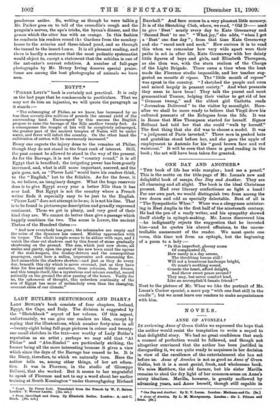EGYPT.*
PIERRE LOTI'S" book is certainly not practical. It is only an the last page that he condescends to particulars. That we may not do him an injustice, we will quote the paragraph as it stands :— "The submerging of Philae, as we know, has increased by no less than seventy-five millions of pounds the annual yield of the surrounding land. Encouraged by this success the English propose to raise the barrage of the Nile another twenty feet. As a consequence the temple of Isis will be completely submerged, the greater part of the ancient temples of Nubia will be under water, and fever will infect the country. On the other hand the cultivation of cotton will be enormously increased."
Every one regrets the injury done to the remains at Philae, though they do not stand in the front rank of interest. Still, the past cannot be allowed to stand in the way of the present. As for the Barrage, it is not the "country round," it is all Egypt that is benefited; the irrigating power has been greatly increased, and, what is still more important, assured, and the gain goes, not, as "Pierre Loti" would have his readers think, to the "English," but to the fellabin. As for the fever, it is, we believe, an imaginary danger. What the huge reservoir does is to give Egypt every year a better Nile than it has ever had. But Egypt is not the country where a French writer finds it especially easy to be just to the English. "Pierre Loti" does not attempt to be so; it is not his line. That is to be found in picturesque description and grandly expressed sentiment. These we get in plenty, and very good of their kind they are. We cannot do better than give a passage which happily combines the two. The scene is Luxor, the ancient Thebes of the Hundred (hates:— "And now everybody has gone ; the colonnades are empty and the noise of the dynamos has ceased. Midday approaches -with
its torpor. The whole temple seems to be ablaze with rays, and I
watch the clear cut shadows cast by this forest of stone gradually shortening on the ground. The sun, which just now shone, all smiles and gaiety, upon the quay of the new town amid the uproar of the stall-keepers, the donkey-drivers and the cosmopolitan passengers, casts here a sullen, impressive and consuming fire. And meanwhile the shadows shorten—and just as they do every day, beneath this sky which is never overcast, just as they have done for five and thirty centuries, these columns, these friezes, and this temple itself, like a mysterious and solemn sundial, record patiently on the ground the slow passing of the hours. Verily for us, the ephemerae of thought, this unbroken continuity of the sun of Egypt has more of melancholy even than the changing, overcast skies of our climate."
























































 Previous page
Previous page